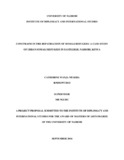| dc.description.abstract | Somali refugees had been in Kenya long before the political unrest of 1990s as they sought livelihood due to famine in their country of origin. Unfortunately, due to the influx of refugees from Somali into Kenya, there was difficulty in implementing the three permanent solutions to the problem of refugees. Respectively, the Kenyan government resolved to the policy of confinement since early 1991, shifting from the reintegration process it had previously embraced. On the other hand, due to Somali‘s insecurity and political instability, taking the refugees back was not possible. The UNHCR and the governments of Somalia and Kenya signed a tripartite agreement in November 10, 2013. This was to oversee voluntary repatriation of exiled individuals. It is in this regard that the study seeks to establish the primary causes of the repatriation, the willingness of the urban refugees to return home as well as possible ways through which the exercise can be enhanced to promote the wellbeing of the affected persons. The arrival of Somali refugees in Kenya as established in this study, created a dilemma for the country. Being a signatory of the international conventions, the Kenyan government was obligated to accommodate the exiles; on the other hand, the government has an obligation to protect its citizens from external forces, which aim at destabilizing the state. The presence of Somali refugees in Kenya is associated with involvement in Al-Shabaab terror group. The call to repatriate Somali immigrants could be a long lasting solution. The state has a responsibility of protecting its population from external threats. Accordingly, the main concern for the Kenyan government should be to manage its border with Somali, identified as the entry point of the Al-Shabaab. Consequently, the Kenyan police forces have been subject to some serious reforms, aiming at increasing their motivation and decrease corruption among the officers, which has been termed as a drawback against fighting the terrorism. On the other hand, more reforms need to be done on the judicial system for the prosecution of the culprits who are arrested by the police force. Accordingly, it has been highly recommended that the UNHCR help by financing and offering financial assistance especially for the police reforms. Furthermore, a closer coordination between the refugees and the law enforcement apparatus is encouraged to curb the association of terrorist and refugees. On the other hand, while repatriation has been identified as the best international norm for solving the refugees‘ dilemma, clear guidelines should be enumerated, as at what cost the practice should be carried on. | en_US |



